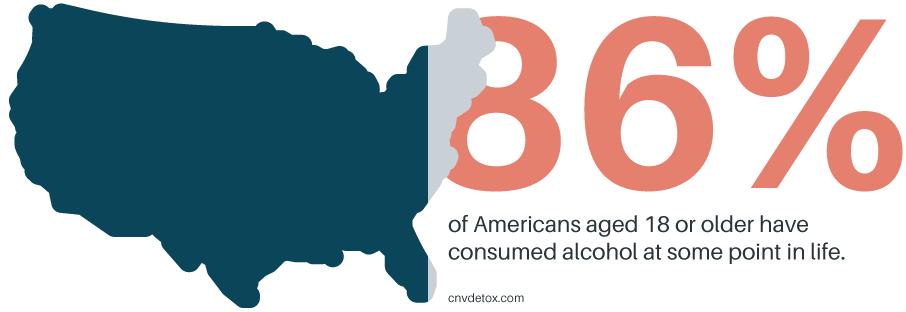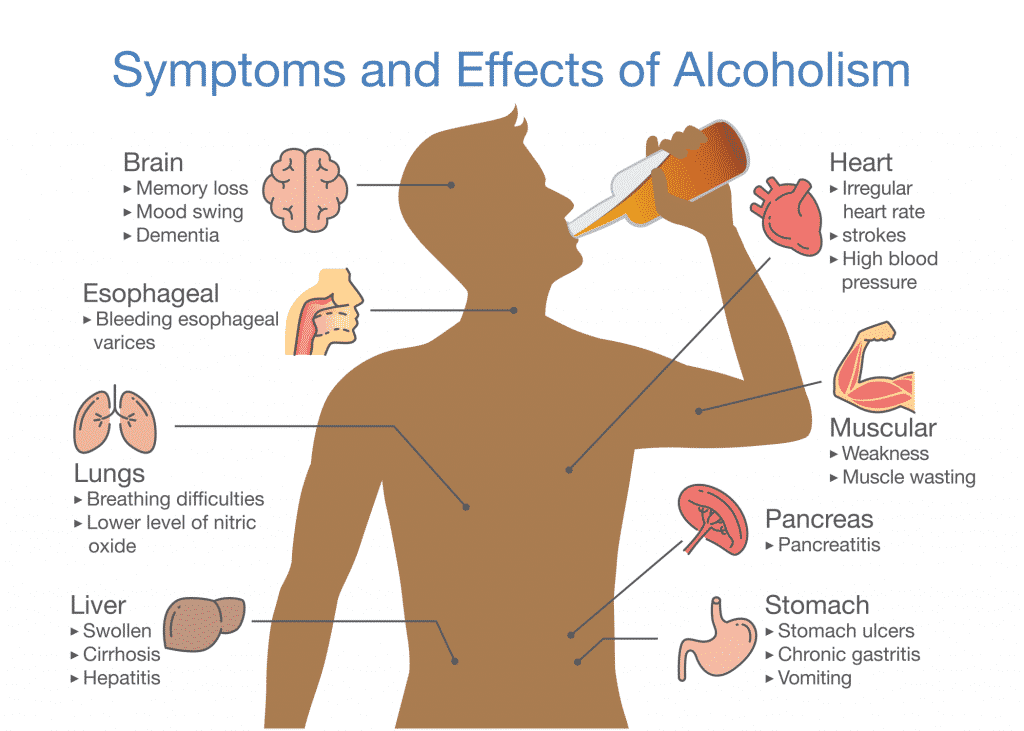Alcohol Treatment Centers
Los Angeles
Table of Contents
- What is Alcoholism
- What Qualifies Someone as an Alcoholic?
- Does Alcohol Affect Men and Women Differently?
- What are the Short-Term Effects of Alcohol?
- What are the Long-Term Effects of Alcohol?
- How is Alcohol Use Disorder Treated?
- What are Common Struggles When Quitting Alcohol?
- Other Health Risks Caused by Alcohol Use Disorder
- The History Behind Alcohol Consumption
Get Treatments For Alcohol Withdrawal in Los Angeles, California
If you drink alcohol heavily for weeks, months, or years, you may have both mental and physical problems when you stop or seriously cut back on how much you drink. This is called alcohol withdrawal. Symptoms can range from mild to serious.
Finding and getting help starts with the right alcohol addiction treatment center, like CNV Drug and Alcohol Detox.
Not every alcoholism treatment works for every person. A multi-treatment approach works best for most people struggling with substance abuse. Attacking the problem on many different fronts can help an individual with alcohol use disorder lead a sober and successful life.
Since AUD affects a person physically, mentally, and spiritually, the treatment approach should address all three aspects.
What is Alcoholism?
Alcoholism is used to describe problem drinking that develops into a severe medical condition. Alcoholism, also referred to as alcohol use disorder (AUD) is a chronic brain disease that is characterized by compulsive alcohol use, loss of control over intake, and a negative emotional state when not drinking. AUD is a relapsing disease.
Statistics on Alcohol Use Disorder
Alcohol use disorder is a large problem in the United States, as well as within Los Angeles, California. Millions of adults and hundreds of thousands of adolescents struggle with alcohol problems.
According to the 2015 National Survey on Drug Use and Health
15.1 million adult Americans 18 and older had alcohol use disorder. This includes almost 10 million males and over 5 million females.
Approximately a little less than 7% of adults with AUD received treatment in the last 12 months.
About 623,000 youths ages 12-17 had AUD. This number includes almost 300,000 males and 323,000 females.
Approximately 5% of adolescents with AUD in the past 12 months received treatment.
The low percentages of people battling alcohol issues that received treatment demonstrates that more awareness, prevention, and addiction treatment programs are needed.

WHAT QUALIFIES SOMEONE AS AN ALCOHOLIC?
In the past year, have you:
- Drank more alcohol or drank for longer durations than you had planned?
- Struggled to lower the amount of alcohol you drink or tried to stop and failed?
- Lost a significant amount of time drinking or recovering from hangovers?
- Found that thoughts of drinking take priority over other thoughts?
- Had problems at work, home, or school, due to drinking or feeling hungover?
- Kept consuming alcohol despite the fact it is causing stress and tensions with your loved ones or co-workers?
- Found that drinking takes precedence over activities you used to enjoy?
- Engaged in unsafe or risky behaviors while under the influence of alcohol (i.e., driving while intoxicated, swimming under the influence, had unsafe sex)?
- Kept drinking despite it causing mental health issues or memory loss (blackouts)?
- Drank more to gain the same previous effects (alcohol tolerance)?
- Began to feel sick and edgy when you don’t drink (alcohol withdrawal)?
If you answer yes to any of these questions, your alcohol consumption may be problematic. The more symptoms you have, the more urgent the need for alcohol addiction treatment.

DOES ALCOHOL AFFECT MEN AND WOMEN DIFFERENTLY?
For men, a risky drinking pattern is drinking more than 14 alcoholic beverages weekly, or more than 4 drinks in one day at least once a month. For women, a risky drinking pattern is drinking more than 7 alcoholic beverages weekly, or more than 3 drinks in one day at least once a month.
What are the Short-Term Effects of Alcohol?
Drinking alcohol leads to effects such as euphoria, intoxication, mood changes, drowsiness, reduced ability to pay attention, and memory issues.
When a person drinks, the ethanol depresses brain function between the excitatory and inhibitory neurotransmitters. Alcohol increases inhibitory neurotransmission and decreases excitatory neurotransmissions.
If the person continues to drink, the depressive effects progress to lethargy, confusion, amnesia, loss of sensation, breathing difficulties, and possibly death.
The psychoactive drug ingredient in alcohol is ethanol. When a person drinks, ethanol relaxes and also produces feelings of euphoria. When a person drinks in excess, intoxication occurs, and pronounced feelings of relaxation and euphoria give way to exhaustion, hangovers, depression, vomiting, and sometimes passing out. These effects occur because alcohol works on the neurotransmitters in the brain.
When alcohol depresses the excitatory neurotransmission, it results in a reduction of social inhibitions. The person becomes less shy, more talkative, bolder, and may do things he or she would not ordinarily do in social situations.
What are the Long-Term Effects of Alcohol?
Prolonged consumption decreases the functioning of the GABA-A receptors in the brain that leads to a decrease in the sensitivity the brain has to neurotransmission. This loss of functioning leads to tolerance as well as alcohol withdrawal symptoms if the individual tries to stop drinking.
Alcohol Tolerance
Alcohol tolerance is where the person needs to drink more to gain the same previous effects. This happens because the brain is compensating for the alcohol’s effects on its functions. The GABA-A receptors attempt to resist the effects, so the person increases the amount he or she is drinking to overcome this compensatory response.
What are the Symptoms of Alcohol Withdrawal?
When a person suddenly stops drinking, withdrawal symptoms that may follow can include:
- Tremors
- Seizures
- Sleeplessness
- Hallucinations
- Confusion
- Agitation
- Delirium Tremens (DTs)
When an individual gets pleasure from drinking alcohol and repeats the behavior to obtain more pleasure, this repetition can lead to the brain adapting to ever-present alcohol. When consumption is abruptly stopped, the brain’s adaptive response is to send out feelings of discomfort and cravings.
These adaptive responses spur the individual to seek out alcohol. Complex, repetitive interactions between neurotransmitters in the brain drive alcohol-pursuing behaviors. When these behaviors constantly cycle (drink – stop – cravings – drink), it is a fully active addiction.
What is Detox from Alcohol Like?
When a person is an alcohol-dependent, withdrawal symptoms after stopping can appear very quickly. Withdrawal symptoms manifest which include nervous system arousal, seizures, hallucinations, and delirium tremens (DT). To control or prevent these symptoms and avoid further complications and possibly death, a medically supervised detox in a formal treatment setting is recommended.
The management of alcohol withdrawal syndrome during a detox uses medications. If specific complications arise during alcohol withdrawal such as DTs and seizures, medications are on hand to be instantly administered.
Remember, detox is not a standalone treatment. Once alcohol is safely removed from the body, a rehab program is needed to avoid relapse. Also, home detox is not recommended. Detoxing at home is dangerous because if any serious withdrawal symptoms or complications occur (and they can happen quickly), there is no medical staff on hand to help.

HOW IS ALCOHOL USE DISORDER TREATED?
Like any other substance abuse problem, treatment starts with a full, individualized evaluation. Once that is completed, a detox will be necessary to rid the individual of any alcohol that may still be in their system. After detox, it will be necessary to move into a treatment program that addresses their needs.
Residential treatment allows for the person to live in our treatment facility while attending treatment and therapy. Outpatient rehab allows for the person to attend treatment during the day and sleep at home. Both programs many of the same different treatment and therapy options, but inpatient requires the person to stay in the facility.
In determining which form of treatment is best for you or a loved one, consider the following:
- Is there a strong family support system in place at home?
- Does the individual have a co-occurring mental illness?
- Has the person attended an addiction treatment program in the past?
- How serious is the alcohol addiction?
- Are there regular responsibilities that only the person attending treatment can handle?
Depending on you or your loved ones circumstances will determine which program will work best. And as always, you should discuss your options with a professional addiction specialist to gain a better understanding of what to expect.
If you believe a more intensive program is needed to start the recovery journey, look into treatment programs that offer a residential rehab option. Inpatient treatment can last as little as a few weeks to several months or more. Also, a detox center that is part of a comprehensive treatment program will make the transition from detox into treatment much smoother.
Addiction Therapies
Addiction therapies can help people recover from alcohol issues by helping them change the way they think. Negative thoughts that lead to destructive behaviors are dissected and reduced, which makes way for positive thoughts and healthier behaviors.
Cognitive behavioral therapy (CBT) is one type of counseling widely used to treat addiction. CBT focuses on anticipating problems and developing effective coping strategies to deal with problems that do not involve alcohol. Counseling sessions may focus on positive and negative consequences of drinking, enhancing the ability to recognize cravings early, identifying and avoiding people and places that may be high risk for drinking, and developing coping skills for dealing with cravings.

12-Step Groups
One of the most easily recognized 12-step groups is Alcoholics Anonymous (AA). Founded in 1935, AA’s principles of following the 12 steps to get and stay sober is still in use today. A few of these steps include turning one’s life over to a higher power and admitting how powerless the person becomes when drinking.
Alcohol withdrawal: Medication Assisted Treatment
Medications can help people recover from alcohol dependence and addiction. They can also be used for ongoing addiction management. These medications can be valuable recovery tools. Since neurotransmitter systems are involved in problem drinking, medications that affect different neurotransmitter systems have been shown to help people recover from AUD.
Opiate antagonists such as naltrexone interfere with the pleasurable effects garnered from drinking. They work by blocking euphoria, which then discourages people from drinking because they are not getting the “high” alcohol brings.
Antidepressant medications can help people with alcohol dependence and depression to stop drinking and maintain sobriety because the medications help reduce their depressive feelings.
Acamprosate is a medication used in the treatment of AUD that affects the neurotransmitters involved in maintaining alcohol dependence. Acamprosate can restore normal activity in these systems.
Since the neurotransmitter serotonin is involved in alcohol dependence, medications that increase the amount of serotonin, called SSRIs (selective serotonin reuptake inhibitors) such as Prozac and Zoloft can help treat depression as well as decrease the reinforcing effects of drinking alcohol.
What are Common Struggles When Quitting Alcohol?
One of the most common struggles when getting sober from alcohol is staying sober. Stress can be a powerful trigger for taking a drink once a person is abstinent. Relapse is common among people who are in recovery from AUD.
The most likely risks for relapse occur during stressful periods, or the recovering person is subjected to places or people associated with drinking in the past.
Another common struggle when getting sober from alcohol is ensuring that co-occurring disorders such as depression are continually treated so that they do not trigger an alcohol addiction relapse. Many people stop taking prescription medications for mental health issues when they feel better.
For example, a person with depression may stop taking antidepressant drugs because they don’t feel depressed anymore. Unfortunately, this absence of medications can trigger a depressive episode, which can lead to drinking for symptom relief. It is important for anyone with co-occurring mental health issues to continue to treat these issues to avoid relapse.
Alcohol Use Disorder and Co-Occurring Conditions
Co-occurring conditions like depression, anxiety, and bipolar disorder often accompany alcohol use disorder as the individual is self-medicating the mental illness. Since alcohol is a depressant, many people believe the alcohol is subduing the effects of the mental illness, however, this is not the cause. Alcohol will actually intensify the worse symptoms associated with any mental health disorder.
If both the mental illness and alcohol use disorder go untreated, both will continue to intensify. Its important to seek treatment soon before long-term alcoholism alters the chemical makeup of the brain. For this reason, alcohol abuse has also been known to bring on a mental health condition.
Alcohol Use Disorder and Cancer
Alcohol has been associated with different types of cancer. Drinking alcoholic beverages is considered consuming a known human carcinogen, according to the US Department of Health and Human Services. 7 Studies show that the more a person drinks, especially those who drink regularly, the higher the risk of developing cancer that is associated with drinking.
3.5% of American Deaths are Alcohol-Related
In 2009, about 3.5% of deaths due to cancer in the United States (19,500 deaths) were alcohol-related.
Cancers that can occur due to heavy drinking include:
- Head and Neck Cancer
- Esophageal Cancer
- Liver Cancer
- Breast Cancer
- Colorectal Cancer
Other Health Risks Caused by Alcohol Use Disorder
Drinking every day or binge drinking can have many adverse effects on the body’s major organs. It can negatively affect the appearance of the brain and how it works. These effects can change behavior, mood, coordination, and thinking.
Heart damage can happen when heavy drinking occurs over a long period of time. Binge drinking in one episode can also damage the heart. Heavy drinking can also damage the liver and lead to liver problems that include fatty liver, cirrhosis, and alcoholic hepatitis. Alcohol also causes the pancreas to produce toxins that can gradually cause pancreatitis, a harmful inflammation of the pancreas that stops proper digestion.
THE HISTORY BEHIND ALCOHOL CONSUMPTION
Alcohol has had a long and varied history in the United States. It has the power to ruin lives, yet it is a socially acceptable way to relax, socialize, and celebrate. Drinking is quite prevalent in our country, as more than 86% of Americans aged 18 or older have consumed alcohol at some point in life. About 70% reported they drank alcohol in the past 12 months, and 56% reported that they drank in the past 30 days.
While many people can drink without it becoming an issue, many others develop unhealthy patterns of drinking. Problem drinking can then become an alcohol use disorder (AUD), more commonly known as alcoholism.
Get Help Today at CNV Detox, Alcohol Treatment Center in Los Angeles
CNV Detox offers comprehensive alcohol addiction treatment at our rehab center in Los Angeles, California. We offer a variety of treatment and therapy options to overcome substance abuse and alcoholism. Our addiction treatment specialists can assist you in aswering any questions regarding what to expect during treatment, so contact us today.
Whether this is the first time you are seeking treatment or if you’ve been through multiple rehab programs, make the effort to go through AUD rehab. You are worth the effort and time that it takes to undergo a recovery journey that can be the door to a new and revitalized life free of alcohol.
Take the Next Step
The path to recovery is only one step away. Begin your treatment at CNV Detox in Los Angeles, California as soon as the same day. For your convenience, we work 24/7. Our team is ready to help as soon as you reach out.



















